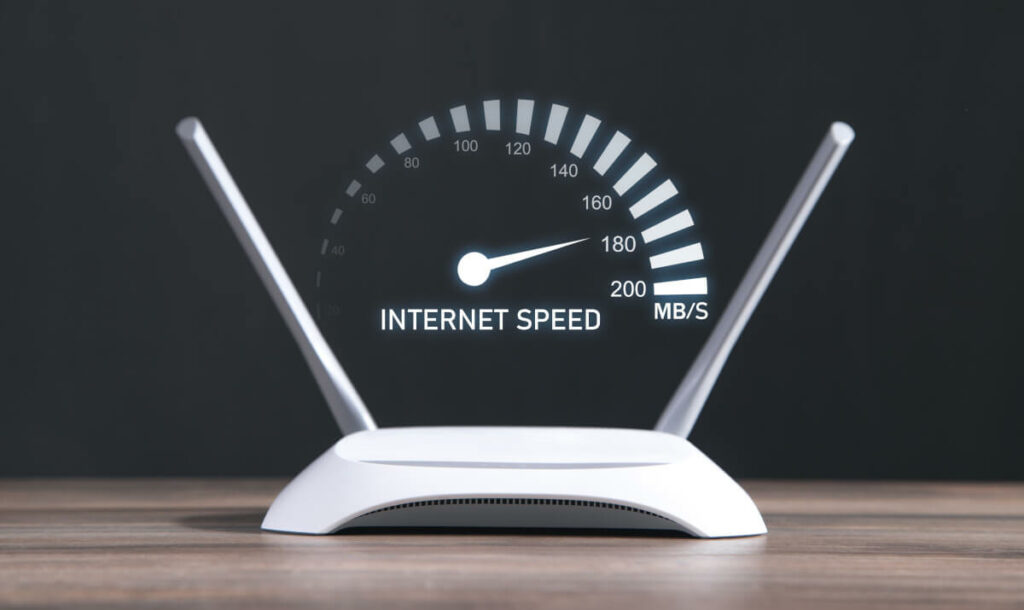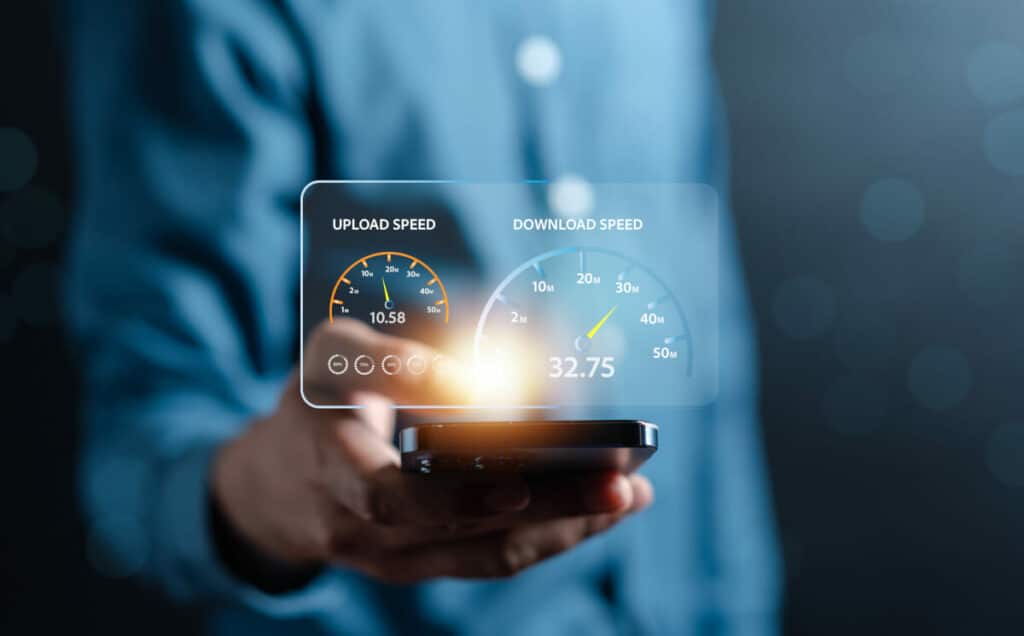the essentials in brief
Normally, an internet speed of at least 25 Mbps is considered normal. Learn more about average speed here...
A 100 MBit connection is required if you need to transfer large amounts of data quickly. Get more information about the most important influencing factors of the internet here...
A minimum speed of 4 Mbps is recommended for 25K streaming.
Have you ever wondered how fast the Average internet speed in Germany is? Internet speed plays a crucial role in surfing the web, downloading files and streaming content.
In this blog article we will take a closer look at the average internet speed in Germany and discuss how it compares to other countries and the demands of the modern world. We'll also look at some of the factors that can affect internet speed and share some tips on how to improve your own internet speed!
Contents
Average speed – what is that actually?

The average speed on the Internet refers to the average download speed in Germany, with which Data from a server to your computer or device can be downloaded. It is usually expressed in megabits per second (Mbps) or kilobits per second (Kbps). A higher average speed means that data is downloaded faster and a faster internet connection is available.
There are various factors that can influence the average download speed in Germany on the Internet, such as the type of connection (wireless or wired), the distance to the server, the number of users using the network, and the speed of the server itself.
To measure the average download speed in Germany, there are various online tools that can perform a speed test. This Tests measure the speed which downloads data from a server to your computer. Most speed tests also measure upload speed, which indicates the speed at which data can be uploaded from your computer to a server.
latency and stability
It is important to note that the average internet speed does not reflect the actual speed at which you can access the internet. Other factors such as latency -- the time between request and response -- and network stability can affect actual speeds.
Average speed of all EU countries in comparison

Internet speed can depending on location, internet service provider and other factors vary, so it's important to realize that the numbers are averages.
To enable comparison, we have one Table with all EU countries and their average internet speed:
| Country | Average Internet Speed (Mbps) |
|---|---|
| Belgium | 100 |
| Bulgaria | 40 |
| Denmark | 140 |
| Germany | 100 |
| Estonia | 100 |
| Finland | 90 |
| France | 70 |
| Greece | 30 |
| Ireland | 70 |
| Italy | 40 |
| Croatia | 50 |
| Latvia | 50 |
| Lithuania | 60 |
| Luxembourg | 100 |
| Malta | 40 |
| Netherlands | 120 |
| Austria | 80 |
| Poland | 60 |
| Portugal | 30 |
| Romania | 50 |
| Sweden | 110 |
| Slovakia | 30 |
| Slovenia | 50 |
| Spain | 50 |
| Czechia | 40 |
| Hungary | 50 |
| Cyprus | 30 |
It can be clearly seen that the Internet in Germany is neither the best nor the worst compared to the individual countries. The countries with the fastest internet in Europe are Denmark, Netherlands, Belgium and Luxembourg, while Greece, Portugal, Cyprus and Romania the slowest are. In a direct internet comparison, Germany lies in between and is rather average.
The Internet in Germany compared to other countries is partly faster and partly slower, so Germany does not have the fastest Internet in Europe. So it can be concluded that we neither have the fastest internet in Europe nor the slowest internet. This means that a Cross-regional and worldwide Internet expansion still necessary is. Without such global internet expansion, internet dropouts will continue to be a part of our lives.
According to the current "State of the Internet" report by Akamai Technologies, the average speed in the third quarter of 2020 was 36,9 Mbps. The internet of Germany is in comparison to the other countries according to this report though much faster than a few years ago, although there are still large regional differences in Germany. While higher speeds are achieved in cities and metropolitan areas, they are often lower in rural areas.
Note: If many users use the network at the same time, this can affect the speed. Avoid congestion by disconnecting unnecessary devices from your network or by using a more powerful modem or router.
Average speed – The most important factors

There are different factorsthat the Average speed of Internet influence in Germany. These include, for example:
- The available technologies: In Germany there are different technologies that can be used for Internet access. These include, for example DSL, cable, LTE or 5G. Depending on the available technology, the speed may vary.
- The network coverage: In order for you to be able to surf the Internet at all, a sufficient network must be available in your region. In rural areas there are often still weaknesses in network coverage, which speed affected.
- Utilization: The more people are on the Internet at the same time, the more the network is used and the slower the average speed. Particularly at peak times, such as in the evening or at the weekend, the speed can therefore drop.
- The quality of the connecting cable: The quality of the connection line, i.e. the line that connects your Internet connection to the network, can also an influence have on the speed. If the line is damaged or outdated, it can slow down the speed.
Tip: If you have a slow connection, you should make sure that your devices are also capable of supporting faster connections. If you have older devices, they may affect the speed.
Improving Internet Speed - Here's what you need to look out for!

if you your Internet speed structures there are a few things you can consider:
- Check your current provider: It's worth checking and comparing your current ISP. You should also compare the internet in Germany with other countries. Other providers may have better offers or tariffs with higher speeds.
- use wifiamplifier: If you keep having trouble connecting to the internet, a WiFiamplifier help that Signal to strengthen and improve speed.
- Avoid disruptive factors: Interfering factors such as other electronic devices placed near your router can affect internet speeds. Try to avoid such disruptive factors to improve speed.
- Install updates: Outdated software or systems can also slow down Internet speeds. Therefore, make sure that you regularly install all available updates.
Attention: If your network is insecure, cybercriminals can access your data or install malware on your device. Make sure your network is secure and use antivirus software to protect yourself from attacks.
Pros and cons of WiFi versus wired internet
When it comes to internet comparisons in Germany, opinions are divided. There are various ways to improve access to the World Wide Web. While wired internet has been the norm for decades, WiFi has seen a massive increase in recent years. Below we will Advantages and disadvantages of both technologies discuss.
Result: Rather average
The average speed of Internet in Germany is average compared to other countries. It is influenced by various factors, such as the one available technology, network coverage and utilization. If you want to improve your internet speed, you can check your current provider, WiFi-Use amplifiers, avoid disruptive factors and install updates regularly.
FAQ about average internet speed in Germany
The average speed of the Internet indicates how fast the Internet can be surfed on average. It is measured in megabits per second (Mbps) and indicates how much data can be transferred per second.
According to the latest "State of the Internet" report from Akamai Technologies, the average speed in the third quarter of 2020 was 36,9 Mbps. However, even in Germany there are still large regional differences.
The average Internet speed in Germany is influenced by factors such as the available technologies, network coverage, utilization and the quality of the connection line.



